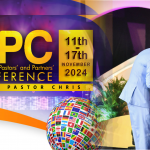
Welcome to another week of the Transformation Leadership Series (TLS). Last week’s lecture was brilliantly summed up by Dr. Abu Bako, founder of the College for Sustainable Transformation and Development and its 8 Institutes as, “an evidence-based post on VALUES! Our nations will be truly and sustainably transformed when we begin to espouse/practice the values contained in the Manual on Life (the Bible) nationally.” We used the cases of China and Uganda.
This week we will continue to discuss the power of values as guiding principles that have shaped our world through shaping the worldview of leadership within nations. The importance of values to transformational leadership cannot be understated.
When China did a 20-year study on what accounted for the supremacy of the West over the rest of the world, it concluded that, “it was the religious heritage of the West that had allowed it to reach such heights” and not the West’s military, political system (democracy), or economic system (capitalism). Rather concerning the pre-eminence of the West, its “Christian moral foundation of social and cultural life was what made possible the emergence of capitalism and then the successful transition to democratic politics”[1].
CHRIST THE FOUNDATION OF ALL
In effect the Chinese claim that transition to true democracy and capitalism is only possible IF founded or established on “Christian moral foundation of social and cultural life”. In other words, without the ethics or values that Christianity espouses, successful transition to democracy and capitalism will be faulty. Could this be why the strain of democracy and capitalism in so-called developing nations seems sub-standard to that in the West?
To show that the Chinese government took the above study seriously, they established a whole government State ‘Administration for Religious Affairs’ to oversee the establishment of ‘churches’ that taught Christian values but not necessarily the personhood of Christ because it wants to remain an atheistic country. Nonetheless they acknowledged the power of such a moral foundation in building transformational leaders.
The idea of a Christian moral foundation being associated with economic prosperity and social work was aptly captured in a BBC article by Christopher Landau entitled “China invests in confident Christians”. In this article Professor Xhuo Xinping confirmed the fact that this idea exists within China. The article explains that though the Communist Party itself does not believe in the existence of a God, it spends money to build churches so that the country can harvest the perceived benefits of religion. The then Director General of the State Administration for Religious Affairs, Wang Zuo’an, was the Communist Party’s senior official responsible for this policy. According to him, there were at least 20 million Chinese Protestant Christians in 2010 worshipping in the state-sanctioned churches. This number has probably increased since that time.
Is it not ironic that a self-proclaimed atheist nation seeks the morality and values that Christianity affords but the Christian West seems to have jettisoned those moral foundations? Is it any wonder China seems to be catching up to the West economically and developmentally? China currently holds the most U.S. debt. Is that coincidence? Scholars have been debating in academic circles whether China will overtake the West. We might not have a conclusive answer to that question now but what we do know is that ever since China did that study, it has undergone sustainable transformation in the area of commerce, manufacturing and industrialization. It currently feeds the Silicon Valley with innovation. Many goods sold in the West today are made in China.
These achievements were not by accident but rather a carefully executed plan of the communist party based on careful study of what made the West great. Love them or hate them, the Chinese have made their mark on modern history and have become a force to reckon with but the foundation of this might of theirs is based on values and ethics emanating from a Christian moral foundation.
Have there been excesses and challenges in their march towards relevance amongst the committee of nations? Absolutely yes! However, their success is palpable. Clearly their ‘gamble’ on Christian values and ethics paid off.
In conclusion, no matter how big your nation is, even if it is the size of China, transformational leadership can turn around its fortunes for the better. Now is China’s current trajectory sustainable? That remains to be seen. There is only so much values and ethical conduct to achieve. For lasting transformation, the nation must get to know the Source of those values and ethics.
[1] Ferguson, N. (2011). Civilization: The west and the rest. London: Allen Lane. p. 685-686
Aikman, D. “A Report on Christianity in China: A Conversation with David Aikman.” Speech at the Ethics and Public Policy Center in Washington, September 26, 2002.)







